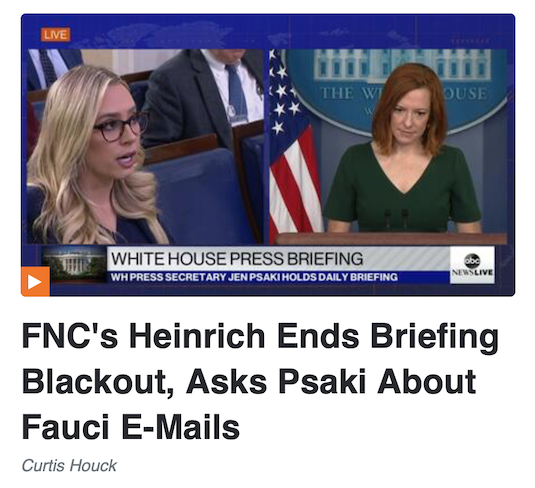The Media Research Center’s Curtis Houck kept up his Psaki-hating, Doocy-loving White House press briefing schtick into June, as his writeup of the first presser of the month showed:
Continuing to show their undying fealty to the altar of Dr. Tony Fauci, the White House press corps refused to ask Press Secretary Jen Psaki a single question during Wednesday’s briefing about the bombshell trove of emails from the NIH official from the early moments of the pandemic.
It was on the mind of at least one reporter in the room as our friend Amber Athey of The Spectator had planned to ask about them, but she wasn’t granted a question during 42-minute briefing.
[…]Fox News’s Peter Doocy took up [NBC reporter Peter] Alexander’s line of question: “Why do you think that these ransomware attacks have been rising since President Biden took office?”
Psaki refused to answer and instead blamed the companies themselves for coincidentally getting hacked within a short time period and not listening to federal guidelines.
Doocy also brought up concerns about “a shortage of workers” in numerous sectors of the economy and the role that increased unemployment benefits could play in discouraging work, but Psaki chose to blame a continued need for workers to feel safe and increase child care facilities.
Actually, the Fauci emails weren’t that big of a deal, and unemployment benefits aren’t causing worker shortages. But those things are part of the right-wing narrative, so Houck must mindlessly repeat them — and he obsessed about the Fauci emails again the next day, while adding another right-wing narrative and introducing Doocy’s Fox News colleague in asking hostile questions:
A day after not one reporter called on during Wednesday’s White House press briefing brought up newly-released e-mails from Dr. Tony Fauci, three reporters stepped up on Thursday’s episode to ask Press Secretary Jen Psaki about the damning e-mails from the early days of the coronavirus pandemic and, on a related note, investigating the origins of the virus in Wuhan.
In fact, a review of the briefing transcript showed three reporters combined to ask only 11 questions on either subject out of 96 total questions from the briefing (which worked out to only about 11.4 percent).
Fox News’s Jacqui Heinrich broke the ice as the fifth reporter called on. After a series of infrastructure questions, she made the pivot and invoked the e-mail between Fauci and NIH Director Dr. Francis Collins that dismissed an April 2020 report from Special Report anchor Bret Baier about the virus escaping from a lab as a “conspiracy” theory.
Asked if that’s still “the position of the administration and their health experts that this was not engineered,” Psaki brushed Heinrich aside, saying she’s “spoken to this pretty extensively” and while she’ll let Fauci “speak for himself…he’s been an undeniable asset in our country’s pandemic response.”
Psaki dismissed the notion of going through what Fauci knew in the early days, calling it “obviously not that advantageous for me to relitigate the substance of e-mails from 17 months ago” when the focus should be on the intelligence community’s ongoing review.
Houck continued his — and Fox News’ — obsession with the Fauci emails for the June 4 hearing:
White House Press Secretary Jen Psaki continued on Friday afternoon to show an aversion to discussing the thousands of published e-mails from Dr. Tony Fauci, repeatedly declining to elaborate on them during Friday’s press briefing. Speaking to Fox’s Peter Doocy, Psaki insisted that, while Fauci can speak for himself, the Biden administration “wouldn’t stand by” while “attacks” are “launched” against him.
Doocy started his Friday Q&A on the subject of a congressional or presidential commission to look at “the initial U.S. response to COVID-19,” but all Psaki would commit to would be the administration’s 90-day review of the intelligence regarding the origins of the virus.[…]
Since Psaki invoked Fauci first, Doocy used that opening to pivot to his e-mails and, after acknowledging Fauci “had his hands full at the time trying to figure out what to do,” the doctor seemed to have been “saying one thing in e-mail and then coming to this microphone and saying something else.”
“If that is the case, and if that affected the U.S. policy posture at the time, should he be held accountable,” wondered Doocy.
Houck certainly perforned his duty as right-wing narrative pusher by repeatedly obsessing over Fauci’s emails — almost as if he had instructed to do so.
